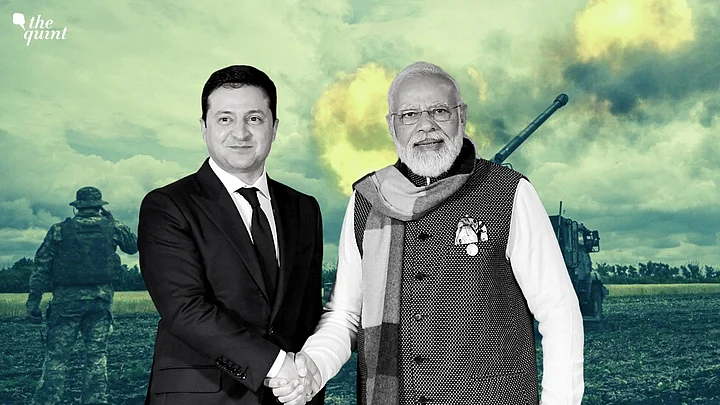Prime Minister Narendra Modi on Tuesday, 4 October, held a telephonic conversation with Ukrainian President Volodymyr Zelenskyy, three days after India abstained on a draft resolution tabled in the United Nations Security Council (UNSC) which condemned Russia’s “illegal referenda” and annexation of four Ukrainian territories.
The two leaders discussed the ongoing Russia-Ukraine war, with Modi reiterating his call for an early cessation of hostilities and the need to pursue the path of dialogue and diplomacy, according to a read-out of the call by the Prime Minister’s Office.
Modi also expressed his “firm conviction that there can be no military solution to the conflict and conveyed India’s readiness to contribute to any peace efforts.”
The prime minister reiterated the importance of respecting the UN Charter, International Law, and the sovereignty and territorial integrity of all states, a press release by his office said.
Amid fears of a nuclear escalation, Modi emphasised the importance of safety and security of nuclear installations, including in Ukraine.
He underlined that endangerment of nuclear facilities could have far-reaching and catastrophic consequences for public health and the environment, the PMO said.
India Skips UNSC Vote
The 15-nation UN Security Council on 30 September voted on the draft resolution tabled by the US and Albania that condemns Russia’s “organisation of illegal so-called referenda in regions within Ukraine’s internationally recognised borders.”
The resolution failed to get adopted as Russia vetoed it. Of the 15-nation Council, 10 nations voted for the resolution while four – China, Gabon, India, and Brazil – abstained.
In the explanation of the vote, here is what India’s Permanent Representative to the UN, Ambassador Ruchira Kamboj, said:
India was deeply disturbed by the recent turn of developments in Ukraine.
India has always advocated that no solution can ever arrive at the cost of human lives.
We urge that all efforts are made by concerned sides for the immediate cessation of violence and hostilities.
Dialogue is the only answer to settling differences and disputes, however daunting that may appear at this moment
The path to peace requires us to keep all channels of diplomacy open.
The global order is anchored on the principles of the UN Charter, international law and respect for sovereignty and the territorial integrity of all states.
Escalation of rhetoric or tension is in no one’s interest.
It is important that pathways are found for a return to the negotiating table.
Threat of Nuclear Escalation
In the war between Ukraine and Russia, the threat of nuclear escalation has increased recently, with Russian President Vladimir Putin repeatedly warning the West that any attack on Russia could provoke a nuclear response.
Putin has warned the West he was not bluffing when he said he'd be ready to use nuclear weapons to defend Russia.
With the annexation of four new Ukrainian regions, which amount to 15% of Ukraine's total territory, Putin could project any attack on these territories as an attack on Russia itself.
“If the territorial integrity of our country is threatened, we will without doubt use all available means to protect Russia and our people. This is not a bluff.”Vladimir Putin
At a ceremony on 30 September, where he announced the results of referendum in Ukrainian regions, Putin vowed to use “all the powers and means at our disposal” to defend Russia, saying that the United States had set “a precedent” when it dropped two atomic bombs on the Japanese cities of Hiroshima and Nagasaki in 1945, Al Jazeera reported.
US has also taken note of the Russian President’s repeated public threats to use nuclear weapons and has discussed "potential scenarios," as per a CNN report. While the US considers a nuclear strike unlikely, concern about the potential for such an attack has grown in Washington in recent weeks, according to the report. A range of potential scenarios have been studied to have contingency plans in place, the report added.
Annexation of Ukrainian Territories
Putin on Friday, 30 September, declared that people in Luhansk and Donetsk, Kherson, and Zaporizhzhia had voted to be with Russia in a referendum, results of which were declared on 27 September.
"People living in Luhansk and Donetsk, Kherson and Zaporizhzhia are becoming our citizens. Forever,"Putin declared at a ceremony at the Kremlin to announce the referendum.
The four regions amount to 15 percent of Ukraine’s total land area. Besides these, Russia has annexed another 3 percent of Ukraine, including the front lines where Ukrainian soldiers are stationed to fight, such as the Donetsk region.
The total annexed area is at least 90,000 square kilometres of Ukraine territory.
(With inputs from Reuters, Al Jzeera, and CNN.)
(At The Quint, we question everything. Play an active role in shaping our journalism by becoming a member today.)
